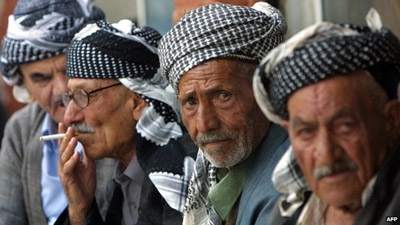What next for the Kurdish people?
March 17, 2015
From Media

With the centennial commemoration of World War One still very much on our minds, it is perhaps appropriate that we are approaching the anniversary of the Allied landings in the Dardanelles.
The effort by British, Australian and New Zealand troops to secure the vital straits ultimately ended in abject failure.
But by the end of World War One, Turkey was defeated and the territory of much of the Ottoman Empire divided up among the victors.
It is this World War One campaign, more than any other, that shaped the crumbling contours of the modern Middle East.
Risky business
The boundaries of Iraq and Syria, bequeathed by colonial powers such as Britain and France, who inherited significant parts of the Ottoman lands, are under threat from the Islamic State (IS) militant group movement.
And for the Kurds, a mostly Sunni Muslim people who straddle many of those borders, with communities in Syria, Turkey, Iraq and Iran, this is a time of great risk, but also, potentially, of great opportunity.
It is the Kurds who, bolstered by US and allied air power, seized back the symbolically important town of Kobane from IS fighters.
And it is Kurdish fighters in northern Iraq who have held the line against IS encroachment.
It is perhaps a small footnote to the history of World War One that the Treaty of Sevres that sought to formalise the division of the Ottoman lands envisaged at least the possibility of an independent Kurdish state.
But during their subsequent and often turbulent history, statehood has been consistently denied the Kurds.
The closest they have come perhaps is in the semi-autonomous area of Iraq which they have ruled ever since the overthrow of Saddam Hussein's regime.
So what does the rise of Islamic State and the weakening of an already unsteady Shia-dominated government in Baghdad mean for the Kurds?
It is a question I put to Joost Hiltermann, programme director for the Middle East and North Africa, for the international Crisis Group.
He told me that prior to the arrival of IS, "the Kurds controlled their own region as well as a large area they claim, called the disputed territories".
"So far, Islamic State has challenged them only in the disputed territories, and this is where all the fighting has taken place," Mr Hiltermann said.
In broad terms it has been favourable to the Kurds.
They "have gained territory", he said, "especially the city of Kirkuk and adjoining oil fields, but they have not gained peace".
"Fighting in these areas will be endemic, as the non-Kurdish population does not necessarily accept Kurdish domination."
Henri Barkey, a professor of international relations at Lehigh University, in the US, and, like Joost Hiltermann, a regular visitor to the region, agrees that in the short term, the rise of IS "has allowed the Kurds to consolidate their claim to the disputed territories".
He said this had "led to the relative strengthening of their cause at the expense of Baghdad, but the weakening of Iraq is not necessarily a good thing for the Kurds as it exposes their vulnerability - especially economic - to political instability and uncertainty".
The Kurds are landlocked, and regional instability affects them disproportionally in terms of investment, commercial relations, export routes for oil and gas, and so on.
"The crisis has weakened the Kurdish economy further," Prof Barkey said.
Iran's increasingly explicit involvement on the side of the Baghdad government also exacerbates problems for the Kurds, according to Prof Barkey.
"It risks," he said, "not just unleashing a sectarian war which will further damage the prospects for stability and a chance for prosperity, but it will undoubtedly drag the Kurds into the conflict.
"You cannot escape your geography."
Iran, he believes, is clearly intent on parlaying its growing direct role in the fighting into lasting political advantage.
Furthermore, as Mr Hiltermann told me, rising Iranian involvement exacerbates intra-Kurdish divisions and so postpones the possibility of Kurdish independence - consistent with Iranian strategic objectives.
Deep divisions
But what then of that aspiration to independence?
Prof Barkey said: "The idea of independence is just below the surface. Everyone knows it is an option. But it has not been invoked, and the reason is simple.
"Kurds cannot afford to be seen as the cause for Iraq's break-up.
"They will become independent when the other parties have given up on being Iraqi.
"Until then, their best best is to consolidate, especially the disputed territories, and use the chaos to carve out a better deal, especially on oil."
Mr Hiltermann said: "The aspiration will always be there and is openly expressed by many, but the Kurds' status will remain unchanged for some time to come.
"They have no realistic chance of independence."
Divided among themselves and divided by national borders, the Kurds' fate is to be manipulated by other regional players.
Turkey, Iran and the US all share an interest in Erbil - the seat of government in northern Iraq - and Baghdad working ever more closely together.
The territorial integrity of Iraq is not to be bargained away for fear that even greater instability will ensue.
One hundred years after the Great War that might have paved the way to a degree of Kurdish independence, a fully independent Kurdistan looks as distant a prospect as ever. Too many powerful players oppose it.











